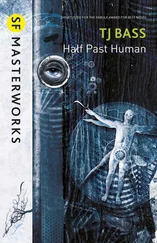People were funny that way—the way they would resist the future and cling to the past. It was like how the concept of a god had never left the species. Very few people alive believed in a god—there was no longer a need to—yet the phrases, “oh my God” or “dear God,” were still commonly used. It was as if people needed those phrases, those concepts from the past, to help them understand the future.
As James shampooed his hair, he reactivated his mind’s eye and checked his phone messages; there were none. He quickly checked his e-mail, but there was nothing interesting. His older brother had sent him some pornographic holoprograms to keep him company, but he didn’t open them—maybe later. At the moment, he wasn’t in the mood. He set the shower to end in five seconds and selected a towel-off of forty degrees Celsius, to begin the moment the shower stopped.
As warm air replaced the water, blowing through the vents and quickly drying him, his thoughts drifted back to Katherine. Why wouldn’t she listen? He’d done nothing wrong—at least, nothing physically wrong.
It’s what you wanted to do that hurts me, James, she said.
But I can’t control what I want to do—I can only control what I actually do , he told her.
And we both know why you didn’t ‘actually’ do anything, don’t we? Don’t we?
She had a point.
After he finished in the shower, James dressed quickly in his standard-issue black uniform. He pulled on the t-shirt and flight pants, then slipped into his flight jacket with the NASA emblem emblazoned on the right shoulder. He walked out of the bedroom, casting one last look at the back of his wife’s head, her blonde hair the only evidence of an actual person in the room with him.
He floated down to the first floor gently and hovered into the kitchen, making a soft landing on the linoleum floor. He opened his mind’s eye once again and activated his food replicator. From the breakfast menu, he selected a poached egg on a bagel, served hot, and a large orange juice, served cold. The food was ready in an instant, and he gulped down his orange juice, deciding to eat the bagel on the way.
He slipped on his flight boots and selected the door open icon in his mind’s eye. Then he stepped on his front lawn and gazed across the water at the downtown core of Vancouver. It was rush hour, and thousands of bodies buzzed above the city. On a good day, he would look at that sight and think of honeybees working on the comb. Today, however, the sight reminded him of flies buzzing around a pile of excrement or a rotting corpse. The sky was brown above the massive skyscrapers and all across the horizon, as though a painter had soiled his thumb and rubbed it across the expanse of what could have been a masterpiece.
James took two quick bites of his bagel and placed the rest in the pocket of his jacket. He pulled on his helmet and looked skyward as he lifted off from his lawn and slowly approached the low-hanging clouds. He liked to take a moment or two before activating his magnetic field. He enjoyed the way the wind felt as he picked up speed on his ascent. As he entered the clouds and began to feel the temperature dropping, he activated the protective field; it produced a greenish light that encapsulated his body. Once the magnetic field was in place, he was free to bolt upward, unhindered by friction, air pressure, temperature, or anything else. In seconds, he was above the stratosphere, using his mind’s eye to plot an automatic course for Venus.
The trip there usually took just under an hour—still one of the longest daily commutes of anyone in the solar system. People regularly commuted between hemispheres on Earth, and some even commuted between the Earth and the moon, but very few commuted interplanetarily. After plotting his course, he bolted forward once again, this time at an even faster rate than before.
As he passed by the moon and breathed the compressed air released by his flight suit, he surfed the Net, as was his customary commuting routine. First, he would check sports. The Vancouver Canucks had lost to an expansion team on Mars; the players blamed the difference in gravity and promised a better performance back on Earth. “Damn. Lost that bet,” James cursed to himself.
Next, he checked the mainstream news. NBC was interviewing James’s boss, Inua Colbe, executive assistant to the president of A.I. governance. The interviewer was sitting across from Colbe, dangling her pointed dress shoe from her foot and smiling as she asked him questions in front of a welcoming fireplace.
“There have been a lot of questions about the delay between upgrades, Dr. Colbe. Can you tell us why it has taken over five years for this latest upgrade to be approved?”
Colbe smiled as he answered. The camera closed in on his smiling face; his pearly white teeth could distract anyone from what was being said, putting them at ease. “The simple fact is that this upgrade is far better than any that have been uploaded in the past. It offers more disease resistance, an increase in muscle tone, and improvements to the cardiovascular system that should increase energy. Then, of course, there is the benefit everyone is talking about.”
“The IQ increase,” the interviewer stated, finishing Inua’s thought.
“That’s right. An increase in neuron growth, specifically targeting spindle cells, which we are forecasting will lead to an eight-point jump in IQ for the average citizen—the biggest jump in history.”
IQ measurements were based on the numbers from before the nans had first started slowly improving the population’s intelligence. An IQ of 100 was no longer the average IQ of a population, since almost everyone alive was now at the same level. There were only a few people who were naturally above the standard level—James was one of them.
“I think people are very much looking forward to the IQ portion of the download. I know that I certainly am.”
“Aren’t we all?” Colbe interjected.
“But why not increase the IQ slowly? We’ve been used to annual improvements of a point or two. Why was there a five-year gap followed suddenly by this huge leap forward?”
Colbe smiled again, this time nodding to show that he understood the concerns of the general public.
He’s a great PR man, thought James, because he’s a phony bastard.
“Well, Keiko, what people have to understand is that as the IQ of the general public increases, it becomes more and more difficult to provide upgrades—not impossible, mind you, but more difficult. In the early days, it was very easy to find countless bright subjects to study so that we could learn a great deal about what structures in their brains facilitated their intelligence. However, once we started getting into the numbers we are entering now, where the IQ of the general public is 149 and about to reach 157, the number of subjects who are naturally this intelligent—those on whom we can model the upgrades—diminishes significantly. Unlike previous upgrades, this particular one isn’t based on a large number of people. Rather, it is actually based on one person, a man named James Keats who is the commander of the terraforming project on Venus, and who happens to have an IQ above 200.”
James opened his mouth in shock. “He screwed me. He…screwed me.”
“My goodness! An IQ above 200 naturally! That’s astounding!”
“He’s an astounding individual, Keiko. He’s only thirty-six years old and is commanding a team of scientists, some of whom are three times his age, on one of the most important projects of our time. He played an integral part in the terraforming of Mars, and he was the only real candidate for the job on Venus. In addition, he was generous enough to offer scans of his brain to the A.I. so this latest upgrade could be modeled on him. He’s a great citizen.”
Читать дальше












